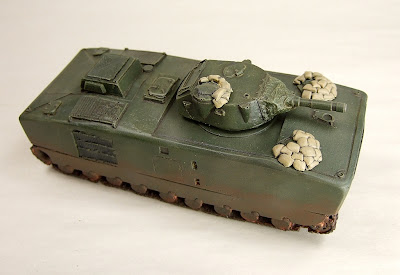 Who goes first? How are they chosen and what can I do about it? Those are always key issues for any group of people about to play a game, friendly or competitive. These are the questions that tell us not only who is pouring the first cup of tea, more importantly they tell us a lot about how the game models command and control and even fog-of-war.
Who goes first? How are they chosen and what can I do about it? Those are always key issues for any group of people about to play a game, friendly or competitive. These are the questions that tell us not only who is pouring the first cup of tea, more importantly they tell us a lot about how the game models command and control and even fog-of-war.Show me a game featuring a new and useful way to answer these questions and you have my attention!
Initiative
Choosing who goes first is often straightforward; dictated by the scenario we want to play, the roll of dice or draw of a card. Often a simplest, but important, aspect of any turn in a game. Bingo, done.
Activaiton
Things are getting interesting. On our turn are we each moving our entire forces, or alternating one unit at a time? Do we pick that unit or is it chosen for us somehow? Either way, this is where much of the strategist's skill lies; moving to counter and exploit the opponent's strength and weakness.
Interruption
Very interesting indeed. Many of us have played games featuring 'Overwatch' at one time or another. Overwatch allows us that chance to interrupt our opponent and, ideally, force them to alter their plans in response to our Overwatch fire. Usually a straightforward feature of a rule-set, Overwatch may or may not have impact on the big picture of the game.
But the evolution and growth in popularity of interruption mechanics from ordinary occasional Overwatch to near constant full-on reactive response by almost any unit in line-of-sight has had me fascinated! Here is a new level of sophistication; bringing unpredictable fluidity to tabletop skirmish gaming.
 The Chain Reaction family from Two Hour Wargames or any of the titles from Ambush Alley Games all feature in-depth action-reaction mechanics designed to echo the chaos and fog-of-war of modern combat. These are exciting, gritty games with loyal fan-bases and strong online community support. Both feature dice mechanics to help establish the success of a reaction or interruption. Both reward the use of 'real world' tactics; the merit of Bounding Overwatch and the failing of poor scouting. Both reward the player for taking the time to get used to new ideas and ground breaking concepts.
The Chain Reaction family from Two Hour Wargames or any of the titles from Ambush Alley Games all feature in-depth action-reaction mechanics designed to echo the chaos and fog-of-war of modern combat. These are exciting, gritty games with loyal fan-bases and strong online community support. Both feature dice mechanics to help establish the success of a reaction or interruption. Both reward the use of 'real world' tactics; the merit of Bounding Overwatch and the failing of poor scouting. Both reward the player for taking the time to get used to new ideas and ground breaking concepts.But I recently encountered another approach to Initiative, Activation and Interruption that knocked me down with the simple and efficient way it handled all three concepts in one step. Something of a middle-way, this system primarily models fog-of-war but also offers ample opportunity for each player to respond to and interrupt the opponent's plans.
I'm Talking About Gruntz Again.
 |
| Gruntz Playing Card Activation. Aces Go First! |
Coupled with the (optional) Overwatch rule Gruntz takes on the complexity and responsiveness of a more involved game with (dare I say it?) less involvement required from each player.
Good to Play
So I'm happy to see yet another game earn itself a spot on my shelf of 'good to play' games. I hope it does the same for you. I hope you enjoy the other reaction based games I have mentioned too; the added tension and excitement they offer is a big part of their fun.
Peabody out.















